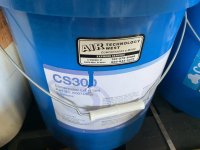I recently got a Haas Super Mini Mill 2 for my workshop. We do light prototyping and R&D in this shop - have basic hand and power tools, a small lathe, laser cutter, manual mill, and now the SMM2. We were using a tiny 1HP 8gallon air compressor for light duty tasks (blowing things off, inflating things, etc.) but the SMM2 needs more air. It requires 4CFM @ 100psi minimum. So I'm looking to upgrade our air supply.
We have some space constraints and I'd like to minimize the noise as much as possible. I came across an older Hydrovane 502 rotary vane compressor (pictured below) for sale locally. Talked to the seller and it sounds like it's seen very, very little use. There is also a dealer nearby that can service it if necessary. From what I see and read online, these Hydrovane compressors are pretty rare here in the US but I gather they're quite popular in the UK. It seems they can go a very long time without much maintenance (oil change, etc.) and they are relatively quiet. I believe this 502 model puts out ~8CFM @ 100psi, and it has a ~3HP motor (runs off 220V single phase, which I have in the shop), and a 30gallon tank. So, it seems like it would be enough for the mill.
My question is this - how do these Hydrovane (or generally rotary vane compressors) do with intermittent use? There will be days and weeks where we won't need the mill, and may only need a tank of air here and there for light shop tasks. I've read some postings online that have said rotary vane and screw compressors don't like a lot of on/off cycling. There could be many days where the compressor might need to kick on just once or twice a day to refill the tank - would that be a problem for this kind of compressor? Another alternative is something like a 4HP model by California Air Tools, which make pretty quiet compressors.
Any thoughts? Would particularly like to hear from anyone who has a one of the smaller Hydrovane compressors (HV01, HV02, 501, 502, etc.) and how it's been for you. Thanks!

We have some space constraints and I'd like to minimize the noise as much as possible. I came across an older Hydrovane 502 rotary vane compressor (pictured below) for sale locally. Talked to the seller and it sounds like it's seen very, very little use. There is also a dealer nearby that can service it if necessary. From what I see and read online, these Hydrovane compressors are pretty rare here in the US but I gather they're quite popular in the UK. It seems they can go a very long time without much maintenance (oil change, etc.) and they are relatively quiet. I believe this 502 model puts out ~8CFM @ 100psi, and it has a ~3HP motor (runs off 220V single phase, which I have in the shop), and a 30gallon tank. So, it seems like it would be enough for the mill.
My question is this - how do these Hydrovane (or generally rotary vane compressors) do with intermittent use? There will be days and weeks where we won't need the mill, and may only need a tank of air here and there for light shop tasks. I've read some postings online that have said rotary vane and screw compressors don't like a lot of on/off cycling. There could be many days where the compressor might need to kick on just once or twice a day to refill the tank - would that be a problem for this kind of compressor? Another alternative is something like a 4HP model by California Air Tools, which make pretty quiet compressors.
Any thoughts? Would particularly like to hear from anyone who has a one of the smaller Hydrovane compressors (HV01, HV02, 501, 502, etc.) and how it's been for you. Thanks!







